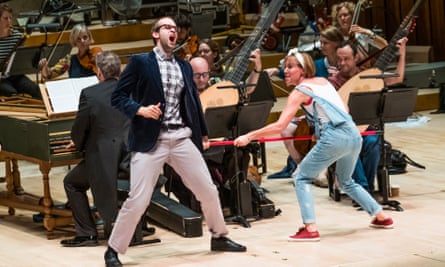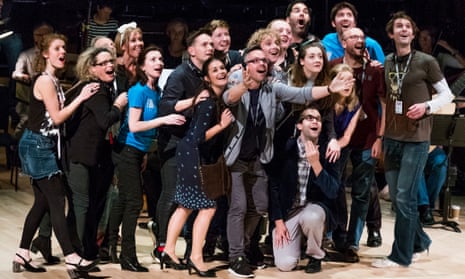‘A semi-staging is a thorny topic for directors,” Daisy Evans writes of her production of Purcell’s The Fairy Queen, which marks both the Academy of Ancient Music’s principal offering for Shakespeare 400 and the start of its major exploration of the composer’s operas. Some would doubtless argue, however, that it is the work itself that is dramatically tricky.
First performed in 1692, it has claims to be the greatest stage score by a British composer. Yet, technically, it is not an opera but a sequence of incidental music, songs and masques for a ramshackle Restoration adaptation of A Midsummer Night’s Dream. Directors’ approaches differ. Most jettison the dialogue and flesh out characters from Purcell’s largely anonymous soloists, though Jonathan Kent, at Glyndebourne in 2009, restored the Shakespearean context in ways that proved revelatory. Evans bravely tries something different with the relationship between speech and song, but the results are at times messy.
The Barbican hall has been turned into a studio space, and what we see is a staged improvisation, as a group of players and singers rehearse and workshop the piece. Though Evans keeps the protagonists anonymous, we gradually observe relationships forming and dissolving. Ashley Riches plays a gawkily shy man with an eye for the lads. Iestyn Davies and Rowan Pierce are lovers, whose affair is foundering on jealousy. Charles Daniels plays a star tenor out of his depth, while Mhairi Lawson is cast as a fussy busybody, first seen cleaning the harpsichord later used by conductor Richard Egarr. Actor Timothy West wanders through it all, interjecting Shakespearean speeches, monologues and sonnets.

There is, however, a lack both of focus and genuine enchantment. Mundane objects are pressed into use to suggest the trappings of magic to variable effect. There is an extraordinary moment when the platform darkens and pocket flashlights suggest shifting star patterns in the night sky. Wire coat hangers strapped to people’s backs, however, don’t ideally work as fairy wings. West’s spoken musings are similarly hit and miss. When Riches, at the end of the Drunken Poet’s Song, produces his scribblings, they turn out to be Sonnet 129 – The Expense of Spirit in a Waste of Shame – which is a lovely touch. But West all too frequently interrupts the masques themselves, which Purcell intended to run as unbroken sequences.
It sounds lovely, though for some inexplicable reason Hymen’s appearance in the final masque has been cut. Egarr conducts with considerable grace, and the playing and singing are sensuous and refined. Davies sounds ravishing in One Charming Night, while Daniels and fellow tenor Gwilym Bowen do bravura stuff with Let the Fifes and the Clarions. Pierce delivers If Love’s a Sweet Passion with knowing regret and beautiful tone. Riches conjures up real magic in Hush, No More, as sleep briefly descends on this confused and confusing human world. We’re reminded, above all, that the score itself is little short of miraculous, despite its theatrical difficulty.

Comments (…)
Sign in or create your Guardian account to join the discussion